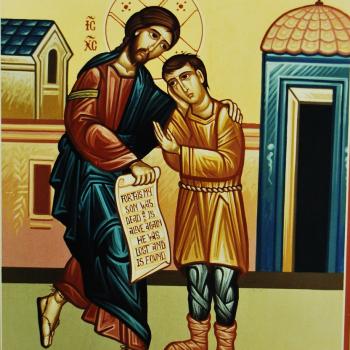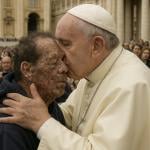
While the novel coronavirus COVID-19 should not be seen as divine punishment, some manipulators are trying to suggest otherwise. They use terrible theological arguments about God’s judgment in order to use the coronavirus as a way to enforce their own particular ideology. For example, some modernist Catholics, denying the piety and holiness possible with communion in the hand, ignore history and say the faithful may only receive communion only on the tongue. They suggest that the virus is God’s judgment upon the world because some people do not follow their demands and receive the eucharist with their hands. But if God were angry for the reason they suggest, would he not make his punishment the kind which reinforces communion on the tongue, instead of having one which makes communion in the hand the safest approach? That is, why would God use a virus to judge humanity which leads to more people having to do what is said to be condemned in order to be spared from the effects of that judgment?[1]
When so-called pious people try to claim the coronavirus as punishment from God, they try to claim something they do not like is the cause of God’s wrath with a fallacious post hoc ergo propter hoc argument. This allows people who oppose them to make a similar argument in reverse, which of course, would also be erroneous, but should demonstrate the weakness of such a method of interpreting the meaning of the coronavirus. Thus, if some Catholic were to say it is a judgment of God because of the recent Amazon Synod, in response, their opponent could it is the result of Catholics rejecting the Synod. Obviously, neither is the case. The virus is not a judgment of God. We should not be looking for reasons for God’s anger to explain why the virus exists. If we want to understand the virus, how it is spread, and how to be protected from it, we use science.
Now, we will be judged by the way we deal with the virus. What we do now will have ramifications on the future. We must take the virus seriously. We must take the effects of the virus seriously. We must also take the economic and social ramifications of dealing with the virus seriously. We must reconsider how we live in the world. The virus shows us that if we are to survive, we must act together as one. We must take care of each other. This is how we will get through the virus as well as all the negative consequences of what we must do in order to deal with it. This is exactly what Pope Francis has been telling us:
This is not a time for indifference, because the whole world is suffering and needs to be united in facing the pandemic. May the risen Jesus grant hope to all the poor, to those living on the peripheries, to refugees and the homeless. May these, the most vulnerable of our brothers and sisters living in the cities and peripheries of every part of the world, not be abandoned. Let us ensure that they do not lack basic necessities (all the more difficult to find now that many businesses are closed) such as medicine and especially the possibility of adequate health care. In light of the present circumstances, may international sanctions be relaxed, since these make it difficult for countries on which they have been imposed to provide adequate support to their citizens, and may all nations be put in a position to meet the greatest needs of the moment through the reduction, if not the forgiveness, of the debt burdening the balance sheets of the poorest nations.[2]
Now is not the time to place extra burdens on those in need. Now is the time for those who have wealth to use it for the sake of humanity. Wealth is not meant to be hoarded up. The rich are not meant to take advantage of the poor and needy, offering them very little immediate help with the expectation of the poor and needy repaying that help severalfold in the future. St. Basil warned the poor of his day not to take such loans from the rich because he knew how they would be destroyed in the future. And to the rich, he said that they should be giving to the poor instead of exploiting them. The fact that the rich will exploit the poor in such a way shows how far they are from following the will of God:
Listen, you rich, to the kind of counsel I am giving to the poor on account of your inhumanity: to remain in dreadful circumstances, rather than accepting the assistance offered by loans at interest. But if you took the Lord at his word, would there be any reason for such words? [3]
St. Salvian likewise condemned the so-called faithful rich who ignore their responsibility to use what they have for the common good:
You who say you are Christian, when you see that Christ is in need, do you leave your wealth to those who are not in need? Christ is poor, and do you further increase the wealth of the rich? Christ is hungry, and do you prepare delicacies for those who are surfeited? Christ complains that He even lacks water, and do you fill the storehouses of the drunken with wine? Christ is weakened by the want of everything, and do you gather an abundance for those who are in luxury? Christ promised you eternal rewards for the gifts given by you, and do you bestow everything on those who will give you nothing? [4]
The economy is made for humanity, not humanity for the economy. The system as it stands is a created construct which can and will one day perish like all such systems. There are good elements to it. In the past, it helped distribute the goods of the earth according to what was possible at the time. There are, of course, many bad things about it as well, and these are what are being used by the rich to exploit the system and use it to benefit themselves alone. The universal destination of goods has been hindered for far too long, creating the economic crisis which we see before us today. The poor do not have work, nor do they have money, but they are expected by the rich to pay their debts with money which they do not have (while the rich use the wealth they have to make themselves richer instead of using it for its proper purpose, which is the common good).
Perhaps the time has come for the old system to pass away. If so, we must do what we can so that all will be supported in the new system. We must do so by following the preferential option for the poor, realizing that the rich have received more than their fair share of the goods of the earth and so must fairly share what they have. We have the means to create a new system, one which takes into consideration the basic needs of everyone so that human life is not equated with a price tag. Technological advances have made the old system of wealth management obsolete. The relationship between labor and livelihood has changed, and so the old relationship must no longer have the voice it once had. Wealth distribution must take this into account in the future.
What will the future be like? How will we be judged for our actions today? Will we strip away human life, making its freedom merely the byproduct of wealth, or will we truly see the value of life transcends money, forcing us to create a new system which recognizes this? Talking to God, Pope Francis says now is the time for us to act, for us to judge for ourselves what is right and do it:
You are calling on us to seize this time of trial as a time of choosing. It is not the time of your judgement, but of our judgement: a time to choose what matters and what passes away, a time to separate what is necessary from what is not. It is a time to get our lives back on track with regard to you, Lord, and to others.[5]
The coronavirus must not be seen as the result of God’s direct judgment on us. He is not judging the world with his wrath without telling us the reason for his judgment. God does not act that way. But we are being tested as a society. We have reached a time of crisis; now we must determine what we shall be like in the future. Will we learn the lessons we need in order to make for a better world, or will we turn away from righteousness and allow our leaders to continue to ignore the common good, creating more hell on earth? Christians, as followers of Christ, must always stand against the gates of hell. We must promote a better future. We must stand for the common good. We must make sure what comes next will help all, especially the poor and needy. If we do not, we will rightfully suffer the hell which we create for ourselves.
[1] This is, of course, not the only reason why this mentality is wrong. It totally misunderstands the way God works with humanity.
[2] Pope Francis, Urbi et Orbi Message for Easter 2020. Vatican translation.
[3] St Basil the Great, “Against Those Who Lend at Interest” in On Social Justice. trans. C. Paul Schroeder (Crestwood, NY: St Vladimir’s Seminary, 2009), 97.
[4] Salvian the Presbyter, “The Four Books of Timothy to the Church” in The Writings of Salvian the Presbyter. Trans. Jeremiah F. O’Sullivan (Washington, DC: CUA Press, 1962), 361-2.
[5] Pope Francis, Urbi et Orbi: Extraordinary Moment of Prayer (3-27-2020). Vatican translation.
Stay in touch! Like A Little Bit of Nothing on Facebook.
If you liked what you read, please consider sharing it with your friends and family!

















